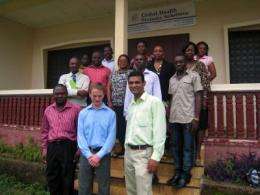New software improves healthcare delivery in Africa

Researchers from the Georgia Tech College of Computing, working in partnership with the Centers for Disease Control and Prevention (CDC), have developed a digital data tracking system to assist low-resource clinical laboratories in developing countries.
Sub-Saharan Africa suffers from some of the greatest health challenges in the world, making the need for efficient healthcare delivery especially vital. However, most hospitals and labs in the region use paper logs and manual entries for tracking data, methods that take up valuable time and are prone to errors and loss of data. In an effort to increase efficiency and allow more patients to be tested accurately, a team led by Professor Santosh Vempala in the School of Computer Science developed the Basic Laboratory Information System (BLIS).
During a six-month pilot implementation in three hospital labs in Cameroon, BLIS accounted for a 66 percent decrease in errors and a 50 percent reduction in employee workload. This led to significantly reduced waiting times, allowing twice as many patients to get tested daily as compared to pre-BLIS operations.
"BLIS is easy to use and intuitive," Sidney Atah, BLIS project coordinator in Cameroon, said. "When configuring the software, you control the behavior and appearance of the system without modifying the program."
Built from freely available, open-source components, BLIS digitizes the traditional data tracking system, resulting in a sustainable program that tracks specimens, results and workflow. Unlike similar software from commercial providers, BLIS is extremely cost-effective, works on limited resources, and requires virtually no training. Additionally, the system is designed to work effectively in countries with very little IT infrastructure and limited connectivity.
"Integrating data tracking software in these labs has been difficult in the past, mainly due to high costs and the failure of other system providers to incorporate the varying needs of labs and hospitals from different countries and cultures," said Vempala, a professor in Georgia Tech's School of Computer Science. "We wanted to design an extremely configurable system that would adapt to fit the needs of its users in order to improve workflow and patient care."
Instead of following a one-size-fits-all approach, BLIS was designed to enable each lab or country to customize and configure the system in a way that suits them best. The digital program seeks regular feedback from users and then incorporates this feedback through system updates, resulting in a program that evolves with the needs of the lab.
Over the past year, BLIS has been implemented in nine laboratories across three African countries: Cameroon, Tanzania and Uganda. Vempala and his team have worked with local lab technicians, representatives from each country's ministry of health and local implementing partners to integrate BLIS into various labs across the three countries.
Dr. Maurice Mouladje, lab director for Buea Regional Hospital in Cameroon, says BLIS has had a positive impact on both patients and staff. Physicians are able to attend to patients promptly, and BLIS provides flexibility in lab technician workload. Similarly, Atah notes that BLIS's reach goes beyond increased efficiency and accuracy.
"BLIS has added confidence and hope in the quality of results and the ability of our institutions to provide quality care to patients," Atah says. "It makes me feel like nothing is impossible to achieve; it is our African dream."
By early 2012, Vempala and his team of Georgia Tech graduate students, Amol Shintre, Akshay Phalnikar and Anu Nair, plan to expand BLIS to labs in Ghana, in addition to incorporating the software in more clinics in Cameroon, Tanzania and Uganda. In the next year, he hopes to make BLIS available to any lab in the developing world, which will also include access to local technical support for a minimal fee.














